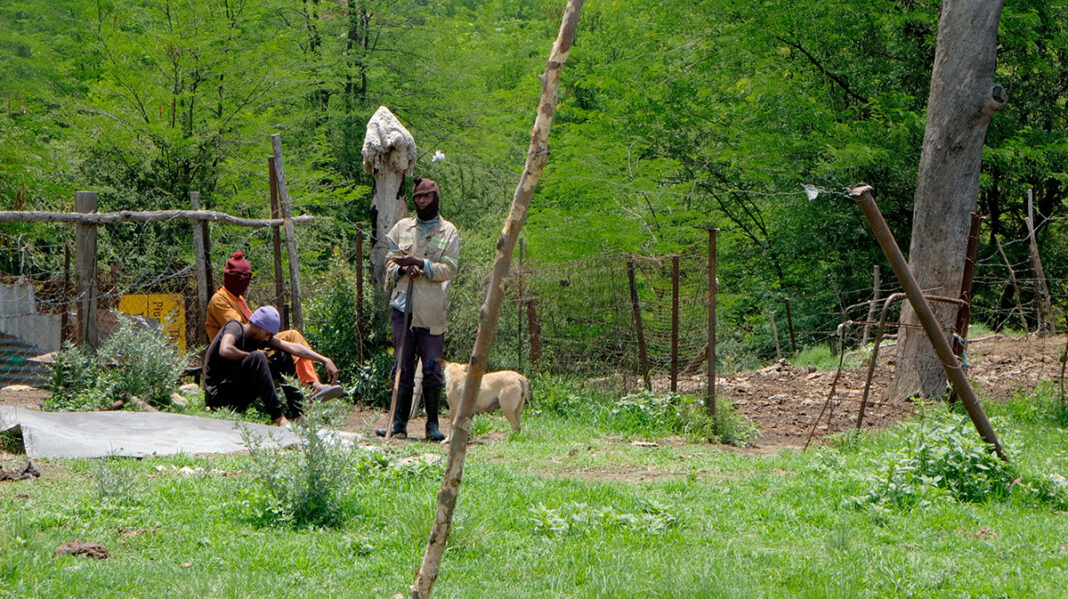Dianah Chiyangwa
On a cloudy day, cattle and sheep graze unattended along a river stream, just a few meters from the Maseru Bridge, which delineates the border between South Africa and Lesotho.
Further up the stream, in the vicinity, a small gathering of herdsmen can be observed at a settlement.
As the festive season commences, significant movements are evident within South Africa and its neighboring countries. These movements often correlate with increased illegal border activities.
Nevertheless, Operation Corona, predominantly led by the South African National Defence Forces (SANDF), has been mobilised to tackle border-related criminal activities.
Ladybrand, a small agricultural town neighboring Maseru Bridge in the eastern part of the Free State province, has been identified through joint operations as a hotspot for illegal border crimes.
Numerous illicit activities have been rampant in this area, including stock theft, illegal livestock grazing and crossing, drug and narcotic smuggling (such as dagga), trafficking of stolen vehicles, as well as the smuggling of weapons, precious metals, gems, and stones.
At the Mohokare River, also known as the Caledon River, separating Maseru and Ladybrand, livestock-related crimes are prevalent. Criminal syndicates, operating across South Africa and Lesotho, exploit the river’s level and flow to facilitate crossings between the two countries.
Illegal grazing stands out as the most common activity in this area, often facilitated by unlawful agreements orchestrated by syndicates involving both farmers and herdsmen.
According to the SANDF intelligence unit, these illicit activities typically occur at night, between 8:00 PM and 4:00 AM.
Teboho Mokotsanyane, a herdsman from Lesotho, highlighted that their community enjoys a peaceful environment safeguarded from livestock theft, thanks to the collaboration between landowners and the SANDF.
The soldiers diligently patrolling the border work tirelessly to curb illegal border activities, intercepting individuals attempting to cross the Caledon River into South Africa.
Lieutenant Mmanti Manamela, Platoon Commander overseeing operations from Maseru to Peka Bridge, noted that herdsmen often graze cattle illegally across the Caledon River into South Africa.
Manamela emphasised the necessity for herdsmen to possess proper documentation for grazing in South Africa. When found without the required documentation, their cattle are impounded, and fines are imposed, as Manamela explained.
Mokotsanyane expressed that despite the peace and protection afforded, herdsmen in the area struggle financially, leading some to engage in criminal activities related to livestock theft.
“After sending money back home to our wives and children in Lesotho, we’re left with almost nothing,” Mokotsanyane lamented, shedding light on the financial struggles faced by herdsmen in the region.
To combat illegal grazing, livestock theft, and various border-related crimes, joint forums and quarterly meetings convene under the Operational Liaison Committee, comprising representatives from South Africa and Lesotho.
These forums, including clusters like the South African Police Service (SAPS), Local Farmers Union/Farmers Watch, Rural Safety Meetings, Cross-Border Committee, and Local Border Post meetings, serve as crucial platforms for information exchange and intelligence sharing.
Members of the SANDF have lauded these meetings for their effectiveness, leading to numerous arrests and a decline in border-related criminal activities.
While certain border areas are not flagged as crime hotspots, SANDF’s vigilant monitoring persists. The integration of technology like drones is being explored to bolster ground surveillance capabilities.
“The establishment of the Border Management Authority (BMA) has notably contributed to our efforts in combating these crimes,” remarked Lt. Manamela.
Despite concerted efforts, SANDF patrols along the border encounter challenges.
Alleged incidents involve Lesotho nationals hurling stones at SANDF members, with some individuals reportedly armed.
Instances of illegal border crossings and confrontations at the Pounding Master in Ladybrand have occurred, where attempts are made to forcibly release impounded livestock or identify illegally grazed animals.
Captain T.E Mathinye, the Alpha Section leader deployed at Maseru Bridge, highlighted that illegal grazing and instances of fence cutting, which divides South Africa and Lesotho, pose significant challenges.
These breaches serve as potential entry points exploited by individuals attempting to evade official ports of entry.
During SANDF operations, approximately 290 cases of illegal grazing were documented, amounting to a value of R 2,046,200.
Additionally, around 40 cases involving the failure to mark livestock were recorded, with an estimated value of R128,000. These operations aimed at curbing border-related crimes have been ongoing since the implementation of Operation Corona on October 23 and continue beyond the festive season.
Summary
- On a cloudy day, cattle and sheep graze unattended along a river stream, just a few meters from the Maseru Bridge, which delineates the border between South Africa and Lesotho.
- Ladybrand, a small agricultural town neighboring Maseru Bridge in the eastern part of the Free State province, has been identified through joint operations as a hotspot for illegal border crimes.
- Numerous illicit activities have been rampant in this area, including stock theft, illegal livestock grazing and crossing, drug and narcotic smuggling (such as dagga), trafficking of stolen vehicles, as well as the smuggling of weapons, precious metals, gems, and stones.

Your Trusted Source for News and Insights in Lesotho!
At Newsday Media, we are passionate about delivering accurate, timely, and engaging news and multimedia content to our diverse audience. Founded with the vision of revolutionizing the media landscape in Lesotho, we have grown into a leading hybrid media company that blends traditional journalism with innovative digital platforms.






